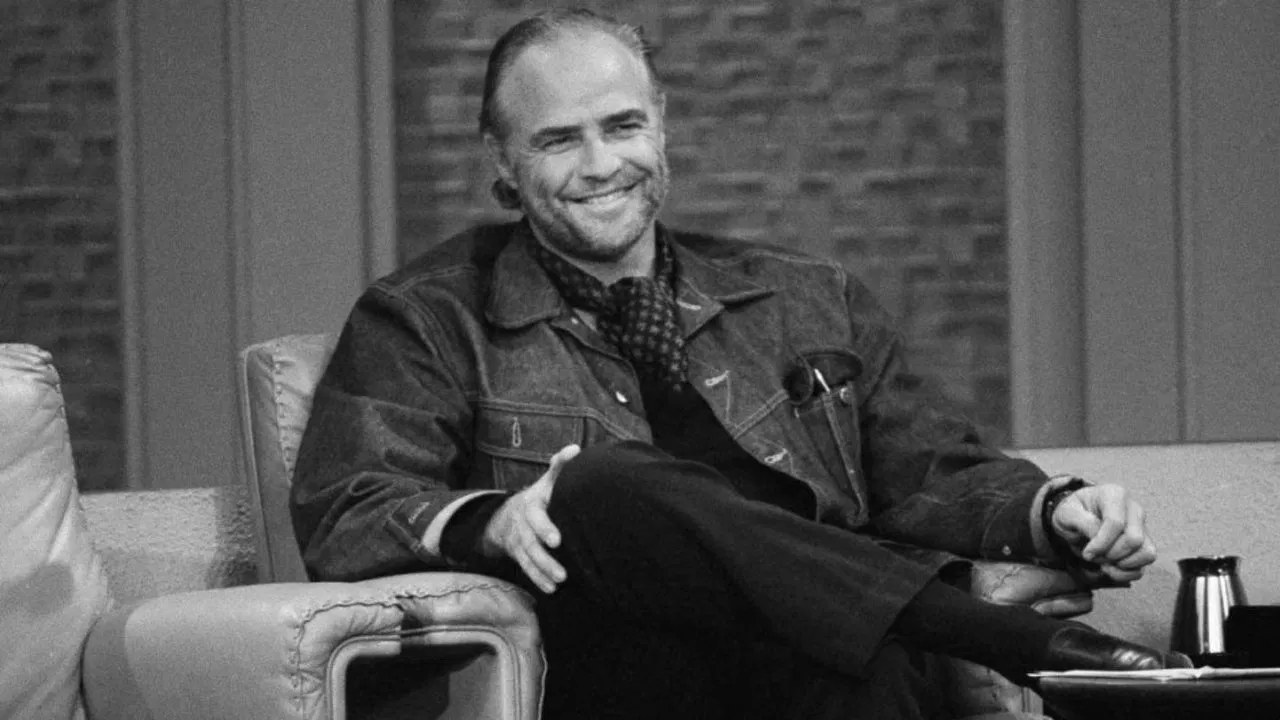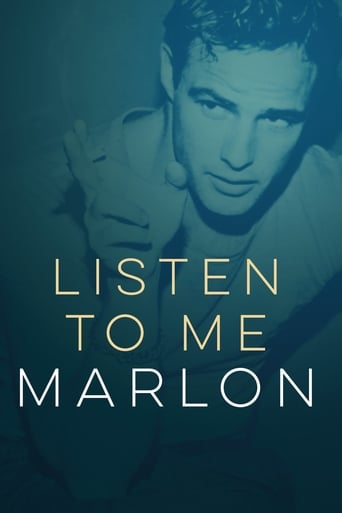

Listen to Me Marlon is a fantastic documentary about one of the best actors in the history of film. A treat for every film lover and everyone who enjoy learning and getting to know about genius people who changed and revived things in their field of work and were never afraid to be themselves. The narrator of this film is Marlon Brando himself. The audio material was taken from hundreds of hours of private recordings that he made and were never released to the public before. It was wonderful listening to some of the things he said about acting, life itself, his views on Native and African Americans, film business, success, his troubled youth and many more. I believe thet every person who is thinking of trying to get into acting should see this. Grat film about a great man.
... View MoreLike The Beatles, Elvis or even the birth of Jesus the constant telling and retelling of the basic known story tends to - initially - put off the would-be consumer to a "new" product. But please don't be. True, Brando's troubled background (both parents being alcoholic) and sudden rise to fame in "Streetcar" (Named Desire) are the stuff of showbiz legend.(To be snobbish to other reviewers I have also read his own autobiography Songs My Mother Taught Me which is required reading if full context and detail is wanted or required. His wives apart.)Yet, despite my doubts, this is an amazing documentary. Indeed it breaks through to another level of understanding and comprehension. Rather like the Watergate Tapes did for our understanding of Nikon.Brando had himself digitised for the video game The Godfather (how they persuaded him to do so is unexplored - money probably) and in this guise he repeatedly speaks his own lines to camera. A device which - like a magician's trick - gets a bit tiresome when over-repeated. The only real fault I can lay at the door of this production apart from the difficulty of actually catching what he said.(Frank Sinatra didn't call him "Mr Mumbles" for nothing.)The central problem with Brando is that he liked to think of himself as an intellectual or even a philosopher, but he simply didn't have the brains for it. Not that he was in any way stupid. Only mediocre. Monty Clift (glimpsed in passing) was a far smarter man and probably a better all-round actor. Shouting and roaring (and doing so as a thick set man) is no real achievement and although he could be subtle he rarely was. Accents weren't his thing either and his appalling British accent on Mutiny of the Bounty showed. Maybe the worst accent this side of Dick Van Dyke in Mary Poppins.(Let us throw a complete blanket over his refusal to learn lines later in the his career - although not glossed over in this documentary.)Healthy genes, a wide smile and devil-may-care attitude attracted many women. And some men. But was there anything more than the passing or cheap thrill about the man? No grade A actress ever did more than have a fling with him and his marriage partners remain a mystery. Nothing here gives us a grain of help - although his good words about Tahitians maybe explains one of his later marriage choices. Not that it didn't - again - fail.Accusations of being difficult on set are treated as being misguided, although he undoubtedly was very difficult and on the set of Last Tango and possibly even criminal. You have no right to go beyond to what is agreed in the script or a rehearsal - even if it does create realism.Finally we have to throw in that overused word "complex." But in lifestyle he wasn't a complex man at all. He liked cheap food (and lots of it), wore cheap clothes and preferred the company of cheap women. His relationship with Michael Jackson is unexplored or even mentioned. Maybe he had lost his mind by then?He does make sense when says that you have to be your own psychiatrist and know your own foibles and their possible causes. I knew that without spending a penny though...He was only a dabbler in politics, although the things he supported were ahead of their time. However his greatest art was to be a one-off and an immortal. The recipe for which remains, as yet, unknown. However one of the key ingredients is to be different...
... View MoreI am a big fan of Marlon Brando, one of our finest actors, and a man whose accomplishments spanned two decades, from to 1952 ("Streetcar Named Desire") to 1972 ("The Godfather"), My personal favorite was "On the Waterfront" (1954) though I took some guilty pleasures in "Viva Zapata" (1952) and "The Wild One" (1953).Leaving aside his marvelous acting abilities, I never had much respect or admiration for what I knew of his personal life. A few early TV appearances and the subsequent drama with his family were not indications of a model citizen, and the fact that he was a major star during the Civil Rights era and the Vietnam era but only occasionally used his celebrity in the pursuit of higher goals was a mark against him. He and I did cross paths in 1963 during the "March on Washington", so at least he was more involved than most. In addition he did the incredible refusal to accept his Oscar by protesting the treatment of the American Indians. But there is so much more he could have done.In his acting, the things I admired most were his physicality and his ability to project emotions. His voice, I believe, was his weakest asset. He did have some "message" films ("The Men", "The Ugly American") but many of his films were throwaways ("Desiree", "Guys and Dolls", "One-Eyed Jacks"), and some were downright racist in his ethnic portrayals ("Teahouse of the August Moon", "Viva Zapata"). He made some 40 films, of which 5 are truly exceptional, so that's not a bad record, but it's not outstanding either. And the last 25 years of his life were unremarkable.This documentary about Brando has a lot of voice overs and a few videos along with some clips from many of his films. Given that I believe his voice was his weakest asset, Brando voice-overs are not to my liking.There's lots of personal stuff. Funny to hear his father say about him that he was "not too proud of him as an actor, but very proud as a man". Funny to hear him say "The penis has its own mind". Etc. But I'm not sure there's anything enlightening here. Honestly I don't care about Marlon Brando the person and I certainly don't want to know about his philosophy of life or his theories about psychotherapy. I would be interested in how he was able to do the marvelous acting he did. I'd like to know how he dealt with the notoriety and why he did so many worthless films when his star power could have dictated any film he wanted to do. This documentary gives me what I don't care about and little of what interests me.
... View MoreMarlon Brando was, to say the least, a somewhat enigmatic figure in the public eye for many years - notwithstanding (or because directly of) reports from set or that time he was on Larry King, he could be beautiful, compassionate, difficult, weird, crazy, tragic (re: his kids and what befell them/they did), bizarre, provocative, secret, shy, BIG, and so many things, but above all a box of contradictions. These get to be seen on a bigger canvas and some added context with Listen to Me, Marlon, a documentary that uses (mostly) audio-recorded bytes from Brando as he spoke into a tape recorder for many years, whether it was preparing for a role (as we hear for Apocalypse Now and Last Tango in Paris), self-hypnosis (he had to meditate a lot one can see), and just stuff to leave behind for his kids. From 198 hours (!) of recordings director Riley gets a lot of interesting facts and opinions and takes on life, acting, parents, his kids, Tahiti, and the directors he worked with and roles he made flesh.The contradiction at heart of Brando's career, though it probably extends to his personal life as well, is that he took his craft very seriously - the "method" style and its popularity came by and large from Brando in the 50's via Stella Adler and Stanislavski to use 'real' emotions felt over time to inform the performance - and yet after a short time of making (really) a classic set of films in the 50's, quickly became disenchanted/disillusioned by the process. He's on record here of saying things like 'I've never been in a 'great' movie and there's no such thing as a 'great' movie' and that finding any sort of "art" in it is ridiculous as it's all about money and merchants peddling their works. He may have a point but at the same time undercuts that by how seriously he took digging in to someone like Stanley Kowalski (who was not someone he could identify himself with) or Vito Corleone (who he wanted to give some dignity to as a gangster) or Colonel Kurtz (albeit he perpetuates the myth that Coppola didn't know what he was doing at all until he stepped in, but there's another documentary to see about that whole story of course).So he felt conflicting things about cinema, and yet cared a lot about civil rights and the rights for Native Americans (the notorious moment where he sent Littlefeather to get the Godfather Oscar is still awkwardly funny and touching at the same time). He was a lot of things, but what's impressive about the documentary is how the director is able to tap into many different things and weave together a complete portrait from just over an hour and a half of clips out of 198 hours. While he does overdo some of the music cues (near the end there's opera singing for Godsakes), there's such a wealth of emotions and perspectives given that incidents like the ones with his kids - when Christian was kidnapped at 13 and then, as an adult, convicted of murder involving his half-sisters boyfriend - make him appear very flawed and all the more human for it.Though not altogether fully great (maybe it could've stood being even longer, like there's only so much time so here's the Greatest Hits), I felt like I got a lot of out this, almost like a Citizen Kane if all of the takes were from Kane examining his life and work himself. And it provides a good lesson not just for actors but people in general: pay attention to his you "act" in life, as everybody does it and it's both not special and the most important thing in what you do, whether it's on camera or (especially) off.
... View More